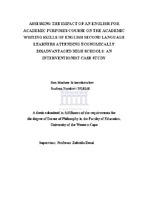Assessing the impact of an English for academic purposes course on the academic writing skills of English second language learners attending economically disadvantaged high schools : an interventionist case study
Abstract
Academic writing skills are vitally important for South African learners in both high
school and tertiary contexts. The importance of such writing skills is even more
pronounced for English Second Language (ESL) speakers, as such learners often attend low-performing schools (that inculcate poor levels of academic literacy), and also face the challenge of writing in a non-native language. This study is an attempt to understand how a specially designed English for Academic Purposes (EAP) course can improve the academic writing of bilingual, economically disadvantaged high-school South African learners. The study analysed the effects of the EAP course on Grade 11 learners from two 'nofees' high schools located in Khayeltisha and Delft. Over a seven-week period Grade 11 learners from these schools attended the EAP course twice a week (after school hours on their school premises) and submitted a total of fourteen written assignments (seven rough drafts, and seven final drafts). These assignments required the learners to formulate essay-like responses to literary and philosophical texts. The learners shaped their responses by making reference to structured classroom discussions (led by the EAP course instructor), as well as standardised notes and assignment instructions. The conceptual frameworks that guided this study were mapped using a variety of sources and materials. Whilst Hyland's (2005, 2006) influential writings on EAP helped the researcher situate the study's academic writing skill's course within an EAP paradigm, recent theoretical and empirical advancements in cognitive science (in particular by Tooby & Cosmides 1992; Gallistel 2000; Wagner &Wagner 2003) helped to justify the specifically 'modular' approach to academic writing skills that the course favoured. Finally, testimonies about the function of creative fiction (see Pessoa 2010; Kafka 2013; Barnes 2012; Pinker 2011) played an important part in shaping the EAP course's approach to text-orientated academic writing skills. Importantly, this study also aimed to describe and analyse various factors that threatened the implementation of the academic writing skills course. In relation to attrition – a phenomenon which clearly presented the single greatest threat to the intervention – Bandura's theoretical writings on the structure of agency (2006, 2005, 2004, 2001, 1998, 1997, 1994) provided a rich source of justification for many of the conclusions that the study derived about the underlying factors that drove the high dropout
rate. Another key aim of this study was to transmit writing skills that would boost levels of learner preparedness for matric and first-year university. To establish a link between the course and the writing requirements of certain matric and university subjects, the researcher compared the contents of the writing skills course to the contents of these subjects. This comparative analysis relied heavily on matric and first-year university source material (i.e. exam papers, memorandums, marking rubrics, departmental handouts, etc.). In terms of its findings, the study discovered many striking parallels between the Grade 11 learners at Khayelitsha and Delft. Firstly, in both experimental groups, a preintervention writing task revealed that – prior to the EAP course's inception – the overwhelming majority of the learners were not in firm possession of virtually any of the writings skills the EAP course aimed to transmit. Secondly, in both groups, it was found that the EAP course significantly improved the learners' academic writing skills. Although this improvement was not especially visible in the learners' grade-based results for the EAP course (due, mainly, to absenteeism and resulting missed assignments), a thorough qualitative analysis of the learners' preintervention, early and late EAP assignments demonstrated that – by the end of the course – most of the learners had gained fairly high degrees of proficiency in a range of critically important academic writing skills. Thirdly, qualitative data – derived from observations and interviews – established that the high rates of attrition and absenteeism that plagued both experimental groups was chiefly due to a single cause: weak levels of agency. On the basis of this study's findings, a number of recommendations can be put forward. Firstly, the many parallels between the two experimental groups suggest that the EAP course designed by this study could achieve comparable results in other South African township schools. Secondly, due to the difficulties that this study encountered in relation to high absenteeism and attrition rates, it is recommended that future implementations of the EAP course adopt a number of measures to improve learners' perceptions of their self-efficacy. Finally, it is recommended that future versions of the EAP course could include a 'matric study skills module'.

